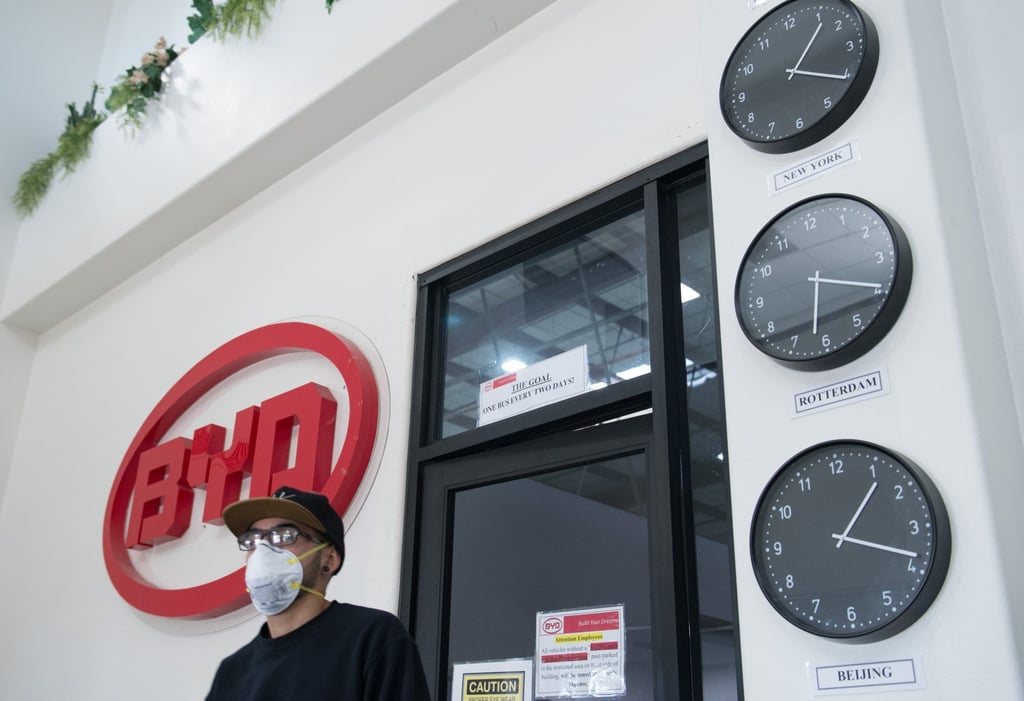World
Donald Trump’s invitation to Chinese carmakers might boost US EV transition

While the former president has previously only taken hits at EVs – saying that they will “kill” the US auto industry and that he would rescind federal support for them – he now strikes a more flexible tone. They’re “incredible” but “not for everybody”, he said, after meeting Tesla’s chief executive Elon Musk.
For Trump, the overture to Chinese companies is an alternative to cheap Chinese autos flooding US markets, a concern that both he and other Republicans like Senator Marco Rubio of Florida have repeatedly raised amid reports of Chinese electric vehicle and battery manufacturers considering building plants in Mexico.
Amid already substantial tariffs on Chinese electric vehicles and batteries – and fiery rhetoric against Chinese investment – Trump’s invitation has the potential to change the course of the US transition to EVs as well as open doors to Chinese business in a segment that has so far appeared closed.
Though far from fully fleshed out, his pitch is in line with a growing recognition worldwide of China’s critical role to the development of the EV industry and suggests an emerging split within the Republican Party about the future of Chinese industrial investment on US soil.
Indeed, Republicans have made political hay opposing Chinese manufacturers in the US.
In 2022, US President Joe Biden’s Inflation Reduction Act vastly expanded battery and EV tax credits to reduce reliance on Chinese suppliers, but Chinese companies can still benefit through using carveouts or meeting certain conditions.
But such plans triggered local opposition. At a roundtable last Friday, Representative John Moolenaar, a Michigan Republican who chairs the House select committee on China, focused on the ties between Chinese companies and the Chinese Communist Party in opposing any role for Gotion in America.
“I want to see this area have more jobs and investment but we must not welcome companies that are controlled by people who see us as the enemy,” Moolenaar said, addressing an audience in Michigan’s rural Green Charter Township, where one of the plants would be built.
Moolenaar, joined by Representative Darin LaHood, Republican of Illinois, accused Gotion of being linked to forced labour, and promoted a bill they introduced last year that would prevent Chinese companies from benefiting from IRA tax credits.
While the congressmen have yet to adopt a specific stance on Chinese carmakers setting up shop in the US, other stakeholders already have.
Scott Paul, the head of the Alliance for American Manufacturing trade group, called it a “foolish” idea. “At a time when many new and established brands are just scaling up EV production, [a] Beijing-backed Chinese auto juggernaut could wipe them out.”
Democrats, too, have expressed scepticism about letting Chinese carmakers into the US, trying to strike a balance between embracing a green future and guarding against potential national security risks.
“The Biden administration worries that Chinese cars, given the number of sensors and cameras and other sorts of devices on them, are essentially, as Gina Raimondo has said, ‘spy cameras on wheels’,” said Peter Harrell, a fellow at the Carnegie Endowment for International Peace, referring to Biden’s Commerce secretary.
“And that’s why Biden’s Commerce Department has launched a potential rule making process focused on the data security risks that could potentially shut Chinese car companies out of the US market – even if they’re actually manufacturing the cars here,” he added. That rule making process is expected to be completed later this year.
Trump can do a lot to influence his party on this type of policy because he doesn’t need Congress to approve foreign direct investment
China dominates the global EV industry. In 2021, almost 80 per cent of all lithium-ion batteries for EVs worldwide originated from China, and the International Energy Agency says nearly 60 per cent of global EV sales as of 2023 are Chinese-made.
Chinese electric vehicles are also selling much more competitively with the meteoric rise of China’s BYD. The company, which now rivals Tesla as the leading global maker of EVs, sells its cheapest model for about US$21,000 outside China – thousands of dollars less than the cheapest US EV.
In May, the Biden administration announced discretionary tariffs of 100 per cent on electric vehicles from China and 25 per cent on Chinese-made lithium-ion batteries for EVs, contending they were in retaliation for Beijing’s unfair trade practices.
The European Union, too, has taken action, raising tariffs on Chinese EVs by up to about 38 per cent in July.
But even as protectionist walls have come up, there are signs that the tables are turning, with Europe considering using its new tariffs as leverage to induce Chinese EV makers to form joint ventures on the continent.
Proponents of greater Chinese industrial investment argue that it provides benefits for both sides, and that the US would not be able to build a competitive electric vehicle industry without involving the world leader in EVs.
“I want the jobs, bring the capital, bring the know-how, and we have to trust American ingenuity to be able to absorb that and run with it,” Michael Dunne, founder of the Dunne Insights consultancy, contended on The Global Lithium podcast.
Dunne, a former General Motors executive, said the US ought to take a page from China’s playbook from the 1980s: encourage joint ventures to build up its auto industry.
“We’ll own a majority share. You have minority, but you get access to our lucrative market. And over time we hope to be able to learn how you make batteries.”
There’s also precedent. Faced with technologically advanced Japanese cars in the 1980s, US President Ronald Reagan negotiated a “voluntary export restraint” with Japan, limiting Japanese auto exports to the US and encouraging Japanese carmakers to establish plants in the US.
Trump has not spelled out the conditions he envisioned for Chinese carmakers to operate in the US. The Trump campaign did not respond to a request for comment.
But if Trump sought to encourage such investment, analysts said, he might not need the support of Republican lawmakers. And compared to his Democratic counterparts, they say, the former president is less vulnerable to being seen as weak on China, giving him more flexibility to invite Chinese firms in.
“Trump can do a lot to influence his party on this type of policy because he doesn’t need Congress to approve foreign direct investment,” said Jack Zhang, an assistant professor of political science at the University of Kansas, adding that foreign auto plants have previously found receptive audiences in red states for the jobs they bring.
Chinese carmakers, for their part, have stayed mostly quiet and are taking a wait-and-see approach. BYD, for example, operates an electric bus plant in California but has not announced plans to make or sell its cars in the US. It did not respond to a request for comment.

Chinese carmakers regard the Biden tariffs as reflective of a broader resistance to Chinese participation in value chains, said Cory Combs, associate director at Trivium China, a Beijing-based consultancy. Even so, they are unlikely to rule out the US market in the foreseeable future.
According to Combs, unlike US corporations, Chinese companies don’t have to be as responsive to stakeholders and have more room to make medium-to-long term plans. “They’re waiting for the market to rationalise,” he said.
“I would much rather be Gotion than another company in five years trying to expand battery production in the US.”

.jpg?itok=Qexy_wA0)








